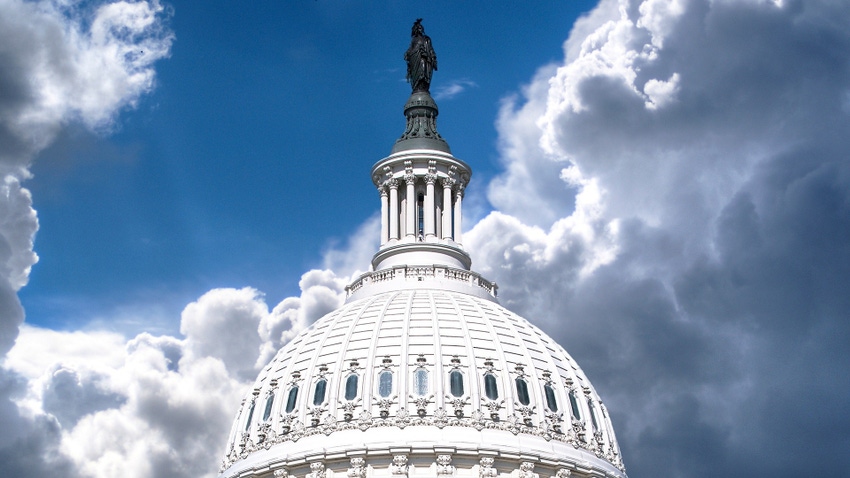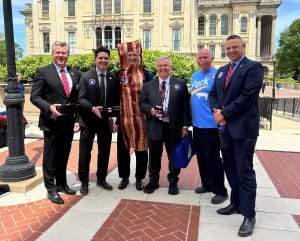USDA offering aid for depopulated livestock and poultry
Legislative Watch: USDA pandemic relief; Reactions to USDA's competition announcement; Checkoff reform legislation introduced.

USDA announced it will provide financial assistance through the Pandemic Livestock Indeminity Program (PLIP) to producers of swine, chickens, and turkey who incurred losses during the pandemic because of insufficient access to processing. Producers will receive assistance to cover losses and the cost of depopulation and disposal of animals.
Secretary of Agriculture Tom Vilsack said, "Throughout the pandemic, we learned very quickly the importance and vulnerability of the supply chain to our food supply. Many livestock producers had to make the unfortunate decision to depopulate their livestock inventory when there simply was no other option. This targeted assistance will help livestock and poultry producers that were among the hardest hit by the pandemic alleviate some financial burden from these losses."
The PLIP will provide payments to producers for losses of swine, chickens, and turkey depopulated from March 1, 2020 through December 26, 2020 because of insufficient processing access as a result of the pandemic. Payments will be based on 80% of the fair market value of the livestock and poultry and the cost of depopulation and disposal. Producers with more than $900,000 in annual income from 2016 through 2018 are not eligible for the program.
Sign-up for the program is July 20 through Sept. 17, 2021 through USDA's Farm Service Agency (FSA).
Reactions to USDA's competition announcement
Reactions were varied from agricultural organizations on the administration and USDA's announcements last week on competition.
"Growing concern about livestock market fairness is accelerated by the continued rise in grocery store meat prices while ranchers struggle to break even on the cattle they raise and poultry farmers being locked into agreements with very little recourse if they’re underpaid,” said Zippy Duvall, president of the American Farm Bureau Federation. It’s time to get to the bottom of what’s driving these imbalances. More opportunities for farmers and ranchers to sell their products will ensure they are paid fairly while providing more options for America’s families."
The National Cattlemen's Beef Association (NCBA) thanked President Biden and Secretary Vilsack for the announcement to increase the accuracy of the "Product of the USA" and the $500 million to expand processing capacity. “Today’s executive order is a vital next step toward securing a steady beef supply chain, and increasing opportunities for profitability for our producers," NCBA said.
National Farmers Union President Rob Larew commented, "After suffering corporate abuse for so many years, it is reassuring that farmers may finally get a level playing field. This executive order will offer them more autonomy in their relationships with corporations, protections from mistreatment, fairer and more accurate labeling, the right to repair their machinery, and more robust local markets – which, taken together, will go a long way towards building the resilient, equitable food system that farmers and consumers deserve."
"President Biden’s executive order calling for USDA to change the Packers and Stockyards rules will have unintended consequences for consumers and producers. Government intervention in the market will increase the cost of food for consumers at a time when many are still suffering from the economic consequences of the pandemic,” said North American Meat Institute President and CEO Julie Anna Potts. “These proposed changes will open the floodgates for litigation that will ultimately limit livestock producers’ ability to market their livestock as they choose. These proposals have been considered and rejected before and they are counter to the precedent set in eight federal appellate circuits."
U.S. Cattlemen's Association said a centralized food system is “a threat to our national security” and believes in pushing forth policy solutions that strengthen the bottom lines of U.S. agricultural producers in order to strengthen the U.S. food security. “President Biden’s executive order is an important step towards restoring a fair and equitable food system."
"Today’s executive order is built on the flawed belief that our economy is over concentrated, stagnant, and fails to generate private investment needed to spur innovation,” stated the U.S. Chamber of Commerce. “Such broadsided claims are out of touch with reality, as our economy has proven to be resilient and remains the envy of the world.”
It continued: “Our economy needs both large and small businesses to thrive -- not centralized government dictates. In many industries, size and scale are important not only to compete, but also to justify massive levels of investment. Larger businesses are also strong partners that rely on and facilitate the growth of smaller businesses."
Checkoff reform legislation introduced
Representatives Dina Titus, D-Nev., and Nancy Mace, R-S.C., have introduced the "Opportunities for Fairness in Farming (OFF) Act" to reform USDA's checkoff programs to provide greater accountability and transparency.
The legislation would prevent USDA checkoff programs from funding organizations that lobby, prohibit anticompetitive behavior, ban activity that involves a conflict of interest, and require compliance audits.
"The USDA’s Checkoff Program was supposed to ensure American farmers of all sizes could promote their products across the nation and across the globe,” Mace said in a press release. “For years now, small farmers have seen their hard-earned money used to fund the lobbying efforts of massive, multi-billion-dollar agriculture conglomerates. This program has devolved from producing ‘Got milk?’ ads to creating taxpayer-funded lobbying firms, and it needs to stop."
Sources: P. Scott Shearer, who is solely responsible for the information provided, and wholly own the information. Informa Business Media and all its subsidiaries are not responsible for any of the content contained in this information asset.
About the Author(s)
You May Also Like


